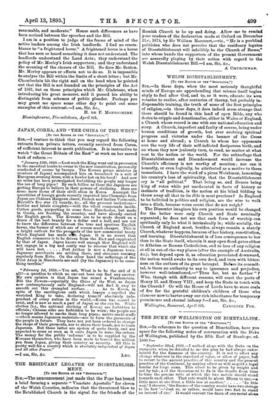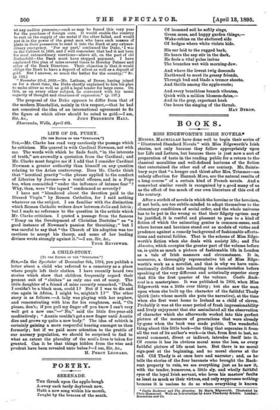THE DUKE OF WELLINGTON ON BIMETALLISM.
[TO THE EDITOR OF THE " SPECTATOR:1
SIR,—In reference to the question of Bimetallism, have you space for the following notes of conversation with the Duke of Wellington, published by the fifth Earl of Stanhope, ed. 1889 P- " September 22nd, 1839.—I walked alone with the Duke on the ramparts, when he detailed to me the plan he had always enter- tained for the finances of the country. It is not to effect any change whatever in the standard of value, or allow of paper, but to revert to the ancient practice of this country and the present practice of the Continent, by making silver as well as gold a legal tender for large sums. This silver to be given by weight and not by tale, and the Government to fix in the Gazette from time to time the precise ratio at which the two metals should stand towards each other. That rate would be about fifteen to one,—a little more at one time, a little less at another.' In this way,' I observe, the finance of the country would have two strings to its bow.'—'Just so, or rather, would have two feet to stand on instead of one.' It would Prevent the drain of one metal alone
at any sudden pressure,—such as may be feared this very year for the purchase of foreign corn. It would enable the country to rest on the supply of one metal if the other failed, and would put it in the power of the great men who have such masses of plate in their possession to send it into the Bank at any extraor- dinary emergency. For my part,' continued the Duke, was in the Cabinet in 1826, and I well remember that had it not been for most extraordinary exertions—above all, on the part of old Rothschild—the Bank must have stopped payment. I have explained this plan of mine several times to Horeley Palmer and other of the Bank Directors. Their objection is that it would oblige the Bank to have a deposit of silver as well as a deposit of gold. But I answer, so much the better for the country,'" &c. (p. 158.)
" November 23rd, 1839.—Mr. Latham, of Dover, having joined us for a short time, the Duke shortly explained to him his plan to make silver as well as gold a legal tender for large sums. On this, as on every other subject, he conversed with his usual sagacity of thought and clearness of expression." (p. 197.) The proposal of the Duke appears to differ from that of the modern Bimetallist, mainly in this respect,—that he had not conceived the idea of an international agreement to fix the figure at which silver should be rated to gold.—I am, Sir, &c., JOHN FREDERICK HALL. Sharconthe, Wells, April 6th.



































 Previous page
Previous page